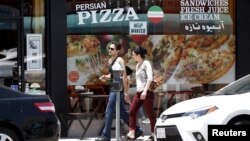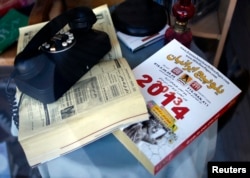Farid Khanlou owns Jordan Market in an area of Los Angeles called Persian Square. It's packed with Persian businesses, many of which fly the country's flag from before the 1979 Iranian revolution.
In this heart of the Iranian-American community, the largest group of Iranians abroad, there are some who do not affiliate themselves with either the Democratic or Republican party.
Khanlou said he would not vote for either candidate in the upcoming presidential election because he didn't like Republican candidate Donald Trump and thought Democratic candidate Hillary Clinton would only continue President Barack Obama's policies, such as his national health insurance program, also known as Obamacare.
"Trump, you cannot trust his word, and Clinton, it's bad for the economy. It's bad for me because Obamacare is killing me for my health insurance. This is not right. I'm paying almost $30,000 in health insurance because of the Obamacare," Khanlou said.
According to a poll by Zogby Research Services released at the beginning of the year, 87 percent of Iranian-Americans were registered to vote in the U.S. Of that group, 52 percent were Democrats and 8 percent were Republicans. But 40 percent identified themselves as either independent or having no party affiliation.
Reasons to reflect
The two major party candidates have both made headlines recently that caused many in the American public to question their character.
Reza Goharzad, an Iranian-American journalist and political analyst, said revelations about Trump's recorded comments on women and the FBI's latest disclosure about looking into more of Clinton's emails have had no great impact on Iranian-Americans' views on the candidates.
"I don't believe that [opinions] changed," Goharzad said. "The people who want to vote for Hillary didn't change their vote. The people who are trying to vote for Trump never change because of this videotape that came out. In the Iranian community, you don't find that kind of swing state or swing people who have not yet decided. Most of Iranians, they vote between two parties. They don't have much of undecided."
WATCH: Iranian-Americans Voice Strong Feelings Toward Presidential Candidates
Party affiliations
Goharzad said the older generation of Iranian-Americans who thought the 1979 Iranian revolution occurred because of former U.S. President Jimmy Carter, who was a Democrat, have traditionally voted Republican.
He said those who were children or young adults when they left Iran almost 40 years ago and their American-born children are largely Democrats.
However, there are Iranian-Americans who vote by issues.
The Public Affairs Alliance of Iranian Americans conducted a survey that showed national security and the economy were the top two issues Iranian-Americans looked at when voting for a candidate.
At the Tochal Market in Los Angeles' Persian Square, Todd Khodadadi said he was concerned about the economy.
"Because I'm Republican, I am supporting Donald Trump. The major reason I'm supporting him is the economy," Khodadadi said. "I believe if he became the president, we can have better economic choices for all of us in the United States."
Trump not taken seriously
Zohreh Forouhi, who was shopping near Persian Square, said she supported Clinton.
Forouhi said she voted for a Republican in the last presidential election, but not this time. "I think I [will] vote [for] Hillary. I did last time for the Republican, but I changed my parties," she said.
She said many of the people she knows do not think Trump is a serious candidate.
"Everybody just thought he's crazy and acting weird and just wants to fight," Forouhi said. "He doesn't care about other people. He wants to make America great, but how? Nobody has any idea."
Issues involving Iran
When it comes to Iran, the Public Affairs Alliance survey showed Iranian-Americans said the top two issues that affected them and were most important to them were promoting human rights in Iran and lifting the U.S. trade embargo against Iran.
A man in Persian Square who would identify himself only as Reza said he was looking at each candidate's policy toward Iran.
"I think the candidates should offer their utmost respect to the Iranians," he said. "Iranians know where their interests lay. But the world community should expose the [Iranian] regime's corruptions and show that it does not represent the Iranian people. It's better for Mr. Trump to stop lying, and he should put a halt to attacking Iranians."
But Bijan Khalili, publisher of the weekly newspaper Iran Shahr, said Trump was attractive to some Iranian-Americans.
"Some of the Iranians really like the way that he talks, being harder against the Islamic Republic because of matters of human rights," Khalili said.
Goharzad said some Republicans within the Iranian-American community think Trump may cause a regime change in Iran.
"[They believe] Trump will change the relation with Iran and the government will collapse and there will be a government change in Iran, so they like Trump," he said.
Change by Iranians
Goharzad said some in the Iranian community who support Clinton believe if there is a change within Iran, they want it to be done by the Iranian people and not with the help of foreign countries.
Reza said he feared Trump's policies. "I think Mrs. Clinton has a better chance, because of Trump's background and profession," he said. "Also, his speeches are aggressive towards the minorities. He's an extremist who poses danger to both the U.S. and the world."
The National Iranian American Council estimates there are 1 million Iranian-Americans in the U.S. Khalili said they would be looking to the next U.S. president to focus more on human rights issues in Iran.







